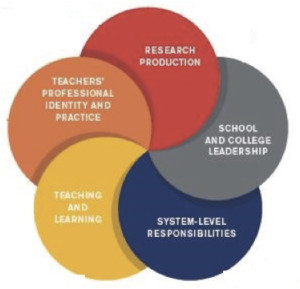Given the RSA’s long tradition for running successful, influential commissions and Inquiries, it’s not surprising that we are often asked to lead commissions on various aspects of public policy. Too often, however, the instigators are frankly not that inquiring – they see a commission approach as a subtle marketing ploy to pitch solutions they already have in mind. Whenever these suggestions pass my inbox, I ask one simple question: “is this just a campaign masked as an Inquiry?”
I asked this of the British Education Research Association’s (BERA) approach to us this time last year to work on an Inquiry into the role of research in UK teacher education. Refreshingly, from the beginning, it was clear that BERA’s focus was on improving outcomes for learners, and wanted an Inquiry that was guided by the evidence rather than the interests of their members.
Our final report, launched today, demonstrates how the Inquiry has stuck to these principles. Ultimately, we are convinced that the four UK nations’ attempts to create world class, self-improving school systems will fail unless greater prominence is given to teachers’ engagement with research, and attempts are made to ensure that all teachers become ‘research literate’. However we make no special pleading for the role of universities or academics in this process. Success will be predicated on partnerships (especially with the growing Research-Edcommunity I blogged about here).
The evidence we gathered is clear about the positive impact that a research literate and research engaged profession is likely to have on learner outcomes. Despite this, we found that teachers’ experience of professional development in most parts of the UK is “fragmented, occasional and insufficiently informed by research” in contrast to that of internationally well-regarded education systems such as Finland, Canada and Singapore. Too often, schools’ ability to make a long-term commitment to creating a research-engaged workforce is being undermined by a target culture and short-term focus on exam results.
The Inquiry makes the case for the development across the UK of self-improving education systems in which all teachers become research literate and many have frequent opportunities for engagement in research and enquiry. This requires that schools and colleges become research-rich environments in which to work. It also requires that teacher researchers and the wider research community work in partnership, rather than in separate and sometimes competing universes. Finally, it demands an end to the false dichotomy between HE and school-based approaches to initial teacher education.
We concluded that everybody in a leadership position – in the policy community, in university departments of education, at school or college level or in academy chains and other intermediaries – has a responsibility to support the creation of the sort of research-rich cultures which can both improve outcomes and close attainment gaps.
To achieve our vision, we identified ten principles that characterise the design of research-rich, self-improving education systems, organised across five themes:

These principles can be used as criteria against which to assess any education system’s approach. They also informed our recommendations for each of the four jurisdictions in the UK. This included establishing a National Network of Research Leaders in Education in each country and changes to the regulations governing teacher training and school inspections.
When I tell the story of the RSA’s education history, I give three examples from the 19th Century: The creation in our House of a new kind of chimney sweep; the campaign for girls’ education which led to the creation of the Girls Day School Trust; and the 1870 Inquiry into the state of education which recommended that government should create a Department for Education. Speaking to a conference for headteachers recently, one heckled back “well, two good ideas out of three isn’t bad!” Although a research-literate profession is no magic bullet to raise standards, it might provide the glue that helps all education interventions and programmes to be more effective and productive. As I wrote in an earlier blog if you can’t stand the research, get out of the classroom? "research literacy matters because it will give the teaching profession the capacity to create a genuinely self-improving system, and the clout to force governments and their regulators to reduce their intervention roles." Get this right (and the UK’s data-drenched education systems provide strong foundations to build on), and perhaps the RSA’s next Inquiry can call for the virtual abolition of the DfE. Although of course, we would never be foolish enough to start with such a solution in mind.
Joe Hallgarten, Director of Education @joehallg


Jen K
17th May 2014
Im in agreement with you on this, and am excited to read the full report. However, from glancing at it so far, one thing that seems to be missing is the notion that a full, cohesive teacher engagement in educational reseach has the capacity to develop and change the processes & discourses around that research.
Despite recognising teachers as appropriate producers, as well as consumers of research, there still feels like a very 'top down' notion of knowledge, with an emphasis on training or initiating teachers in the skills of academic research.
For things to change, don't we need to see teachers as full and equal partners in the research process, and allow that the practice and experienced based knowledge they bring to the table has the power to fundamentally change the shape of educational research?
Gerald Haigh
16th May 2014
Anything is better than a culture of 'tips for teachers' where solutions are passed around regardless of any real understanding of whether and how they might work. Even worse than that, though, is a culture of what Ben Goldacre calls 'Bad science' whereby the name of science is invoked to support theories that are not only wrong but potentially damaging to learning.
That said, I just want to add two points.
Firstly, 'literate' in this context must mean not only being able to understand what the researchers are telling us, but also being able and willing to look closely at how the research was conducted. Given the subtleties and complexities of life in schools and relationships in classrooms, it's extraordinarily difficult to conduct research which comes anywhere near the accepted scientific gold standard of the random controlled trialled. That being so, when school-based research is presented -- for example, where different classes of children have been given different learning materials or taught by different methods -- we all need to pause and reflect what, from our experience, we know about real life with real teachers and real children, and ask ourselves just how rigorous such research can be, and how reliable can be the results. The answer, in some cases, is that the results, despite all those caveats, are based on sufficient numbers, over enough time, to be, if not conclusive, then pretty convincing. In other cases we can legitimately claim that what we're seeing is nothing more than a number of supportive anecdotes.
Evidence literacy means being able to make that kind of judgment.
Secondly, there's a strong case that says, 'evidence is not enough'. If the evidence cuts against the social and moral values of the school and its teachers, then it may well have to be taken on board with whatever adjustments are necessary.
Nigel Rayment
16th May 2014
Joe, this proposal has a great deal recommend it. During my professional lifetime, which has taken me into hundreds of FE and school staff rooms across Great Britain, I have been struck by how little of what is discussed relates to learning theory. If educationists want to halt the attacks on their
profession they need to found their arguments fimly on what works for
their learners. I'm afraid there is a public perception that teachers are more ready to take industrial action over their own terms and conditions
rather than the impact of curriculum and pedagogy on their students.
Campaigns that have successfully overturned plans for hospital closures or mergers, such as that in Lewisham,
have succeeded because health professionals have found common cause
with service users and other community stakeholders around the quality
of service. So, research, yes, but not of the ivory tower kind, but of the type which reflects the concerns of, engages with, and communicates with the wider community.